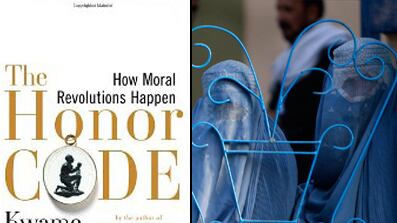Thankfully, busy though we are bemoaning the end of values, some are not beyond evaluating their worth in the first place.

Take integrity. Before The Great American Novelist observed in Freedom, “Integrity is a neutral value. Hyenas have integrity,” Leon Wieseltier of The New Republic made much the same point using Sarah Palin: “Her grotesque and fascinating candidacy broaches an interesting subject, which is the moral insufficiency of integrity.”
Next up was trust, which saw its reputation battered by an economic crisis. The Fed and institutions like the FDIC stepped in to bolster confidence, but economists like Luigi Guiso, Jeffrey Butler, and Paola Giuliano also showed that reckless, misplaced trust contributed to the crisis in the first place. Trust is not simply good, but also something to be managed.
Appiah hopes that honor, a concept invoked in the murder of as many as 5,000 women and girls annually, can also be used to end such crimes.
Now, in an enlightening and bold book by Kwame Anthony Appiah, honor gets its treatment. Though The Honor Code is the work of a professor and philosopher, it is no more detached from reality than are election ballots or employment data. To the contrary, Appiah’s lofty ambition is to conjure up from the realm of ideas a means to stop one of the world’s most ghastly practices, the honor killing of women.
Honor comes in many varied and complicated forms, but Appiah breaks it down into two accessible versions. Rafael Nadal may have the career grand slam, but, as the author points out, he also has esteem, a form of honor distributed according to performance against a standard or against others. Such honor is often based on competition and, as one would expect, lends itself to hierarchies.
There is second type of honor, however, based in the recognition of others as peers or equals. One can gain this form of honor simply by being recognized as belonging to a group, as police, for example, or gentlemen, and, now, as human beings. In a previous book, Cosmopolitanism, Appiah wrote, “I want to hold on to at least one important aspect of the objectivity of values: that there are some values that are, and should be, universal.” One of these universal values, he shows us in the new work, is that all are worthy of respect as people. “Your humanity,” Appiah writes, “entitles you to respect.” Put simply: esteem is what you gain through your successes; dignity is your right as a person. (Or, as the new Levi’s campaign insists, “We are all Workers.”)

Honor, like integrity or trust, is something of an impartial force. It can lend itself to inequality and violence. It can also be channeled, however, to encourage equality and dignity. To demonstrate this point, Appiah provides three historical case studies: the death of dueling in Britain in the early 19th century, the ban on slavery and slave-trading in the British Empire during roughly the same period, and the end of foot-binding in early 20th century China. The similarities in the end of all three practices, Appiah hopes, compose a guideline by which honor can be tamed and harnessed.
First, all three practices were rooted, in part, in honor codes: dueling served honor; binding feet was an issue of status and honor; and, for many non-slave owning whites, the existence of slaves at all granted them the esteem of being from a race that was not owned. Second, moral arguments against the studied practices existed long prior to the end of the practices. Slavery, for example, was recognized by many as morally repugnant long before its end. “It wasn’t the moral arguments that were new,” Appiah writes, “it was the willingness to live by them.” And this could only occur, he says, drawing a third parallel, when moral arguments were buttressed by changes in the distribution of honor. Thus, the banning of slavery and the slave-trade benefited, one, from a growing working class that wanted to see labor as honorable, and, two, from a new desire to bring honor to Britain in contrast to slave-owning America.
Appiah first tried out many of these ideas at the Seeley lectures at Cambridge University. Historians are finicky about drawing clean, applicable lessons from the past, and no doubt some in Cambridge’s Faculty of History winced as Appiah made neat work of messy histories. But presented in The Honor Code, Appiah’s historical case studies, though moving at breakneck speed, are energized, informed, and highly readable.
But, of course, this isn’t just a work of history. Appiah hopes that honor, a concept invoked in the murder of as many as 5,000 women and girls annually, can also be used to end such crimes. In these days of mosque-ophobia it would be all too easy to cast blame for these crimes on a religion or on Pakistan or Iraq. Appiah serves us all when he reminds the reader that the tenets of Islam, as widely understood from the Koran, the Sunnah and the hadith, do not condone the killing of women by men in their own family. “Not all perpetrators of these crimes are Muslims,” he writes, “But very often they are Muslim: and when they are, we can begin the conversation by pointing out that they are contravening and dishonoring their faith.”
Not only are honor killings immoral, they are also often technically illegal. In other words, religion and law have failed to temper them. Appiah’s answer, drawing from history, is to place honor alongside morality and law. “The lesson I draw is that we may have more success with the emancipation of women from honor murder in Pakistan if we work to reshape honor than we will if we simply ring the bell of morality.” External pressure (shame) is meant to be brought to bear on such practices. But how does such pressure make itself felt in Pashtun villages in the North West Frontier or Kandahar province? Is it the job of NGOs or the State Department to traffic in honor and shame? Is it the job of you and me? I suspect so, but I am not sure through what avenues. Here Appiah is rich on the why and the what, but rather thin on the how.
But there is no doubt that honor is a real thing. I once sat on the dusty floor of a home in southern Afghanistan and watched an Afghan warlord request, according to pashtunwali, two American soldiers to replace two sons lost by a village father in an accident with U.S. forces. A U.S. Army Captain offered cash. The warlord, acting on behalf of the father, asked for four American women to replace the two sons. Honor codes were clashing, and though both parties legitimately desired to see amends made, neither possessed the capacity to change the other’s code.
But that does not make Appiah wrong. He is a philosopher-cum-historian, not the policy wonk, and he has most certainly done his job. In The Honor Code, he has offered the foundation for a creative and provocative solution to one of the world’s more notorious evils. That would be enough, but he has also given something more by elegantly reminding us of modernity’s bravest idea: that all people now deserve that most basic honor, dignity.
Plus: Check out Book Beast, for more news on hot titles and authors and excerpts from the latest books.
Ian Klaus was educated at Oxford and Harvard and splits his time between New York, Boston, Washington, D.C., and Sonoma County, California, and is a doctoral candidate in history at Harvard. His book, Elvis Is Titanic, was published by Knopf in 2007.






